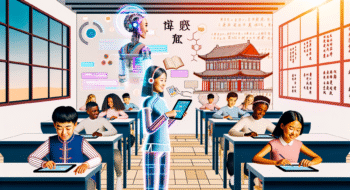As artificial intelligence continues to reshape various industries, students are increasingly drawn to careers within this dynamic field, transcending traditional boundaries of education. The article “From BA to AI” explores how individuals with backgrounds in the arts are pivoting towards opportunities in AI, utilizing their creativity and critical thinking skills to contribute to this technological revolution. This trend highlights a significant shift in the job market, where interdisciplinary approaches are becoming essential in developing innovative AI solutions. Join us as we delve into how these aspiring professionals are navigating this evolving landscape.
The Shift from BA to AI: A New Era for Job Seekers
In recent years, the world of work has witnessed an incredible transformation thanks to the rising influence of artificial intelligence. The narrative has shifted, welcoming students from unexpected fields into a landscape traditionally dominated by the tech-savvy. Recent reports indicate a growing trend where students carrying a Bachelor of Arts (BA) degree are finding ways to bridge the gap between their creativity and AI technology, leading to remarkable career transitions.
So, why are students from the arts venturing into the AI realm? The answer lies within the multifaceted nature of AI itself. Artificial intelligence isn’t just about algorithms and data; it’s also about understanding human behavior, creativity, and interaction. These are lessons that students from liberal arts fields are well-versed in, making them uniquely positioned to contribute to innovative AI solutions.
Desire for Diverse Skill Sets
Employers today are searching for candidates with more than just technical expertise. They want individuals who can approach problems from various angles and devise creative solutions. As businesses integrate AI deeply within their operations, they are beginning to understand the importance of a diverse skill set. Therefore, students with BAs in subjects like psychology, sociology, and even philosophy are increasingly appealing choices for these new roles.
- Psychology: Those educated in psychology understand user behavior and can shape AI systems to improve user experience.
- Sociology: Sociologists can provide insight into social dynamics and ethical implications of AI applications.
- Philosophy: Philosophers can contribute to framing ethical guidelines for the development and implementation of AI technologies.
Building Bridges between Disciplines
The excitement around this interdisciplinary integration cannot be overstated. Universities and educational institutions are adapting their programs to equip students with knowledge that combines both soft skills and technical proficiency. They aim to offer curricula that include courses in AI fundamentals, programming, data analysis, and design thinking. For those who may want to know more about such programs, Neyrotex.com offers insights into educational pathways leading to careers in AI.
The Rising Popularity of Bootcamps
In addition to traditional educational programs, a surge in AI boot camps has surfaced, drawing students who are eager to bridge any gaps in their technical knowledge. These immersive programs provide hands-on experience, covering topics from machine learning to natural language processing in an intensive, condensed format. With such boot camps offering quick entry into the tech domain, many students are opting for this route to enhance their employability.
The Role of Creativity in AI Innovation
One might argue that creativity is a fundamental aspect of AI development since many AI applications respond to human needs and preferences. In this digital age, where technology meets humanity, the ability to think outside the box is becoming invaluable. Students transitioning from the arts to AI are leveraging their creative thinking skills to engage in problem-solving and innovative concept development.
- Creative Storytelling: AI is increasingly utilized in entertainment, necessitating professionals who can narrate compelling stories.
- Visual Design: With a focus on user experience, designers skilled in visual communication are critical for developing engaging AI interfaces.
- Multimedia Content Creation: Students are blending AI with content creation, using technology to enhance creativity across platforms.
Diverse Career Opportunities
What’s the payoff for these students? A plethora of career opportunities awaits those willing to navigate the intersection of arts and AI. Some of the roles include:
- User Experience (UX) Designer: Crafting intuitive interfaces for AI applications.
- Content Strategist: Developing AI-driven media and engaging narratives for audiences.
- Data Analyst: Focusing on qualitative insights to guide AI improvements.
- Ethics Advisory Manager: Ensuring AI practices align with societal values and ethical standards.
For more detailed insights on career paths within AI, consider exploring resources like this link that outlines potential job listings and company demands. The rapidly evolving landscape of AI ensures multiple pathways are open for individuals equipped with a liberal arts background.
Networking and Community Building
As this interdisciplinary trend continues to gain momentum, students are encouraged to tap into communities that foster innovation and collaboration. Local meetups, hackathons, and online forums create spaces where arts students can ally with technical experts in tech-oriented discussions. Networking is invaluable, not only for potential job leads but also for gaining insights into ongoing projects and the latest industry trends.
Engaging with AI through Internships
One of the most effective ways for students to transition into AI careers is to gain real-world experience via internships. These opportunities allow them to apply their creative skills in practical settings while learning fundamental coding languages and data analysis techniques. Organizations are increasingly recognizing the value of diverse backgrounds in their teams, making internships a key strategy in bridging academic preparation with actual career development.
To keep up with current internship offerings in the AI sector, students can visit platforms that specialize in tech careers such as this site, which tracks AI internships nationwide.
The Future is Bright for BA Graduates in AI
Indeed, the future looks promising for BA graduates venturing into AI. With the tech industry expanding, the need for individuals who can think critically, innovatively, and empathetically alongside their programming counterparts will only grow. This new breed of professionals has the potential to mold AI into systems that not only enhance technological capabilities but also resonate with human values.
Conclusion
As students navigate their transition from liberal arts to artificial intelligence, they carry with them a wealth of unique perspectives and skills that are essential for the technological revolution. It’s clear that success in AI isn’t confined to the hard sciences; instead, creativity, discourse, and interdisciplinary collaboration hold extensive value. The story of these students is just beginning, and as they boldly step into the future, they’re destined to make a meaningful impact on the world of AI.
For those interested in learning more about how to embark on this unique career path or wishing to explore further educational opportunities, resources like Neyrotex.com provide ample guidance. The blend of art and technology promises exciting advancements, making it an exhilarating time to be involved in AI.







